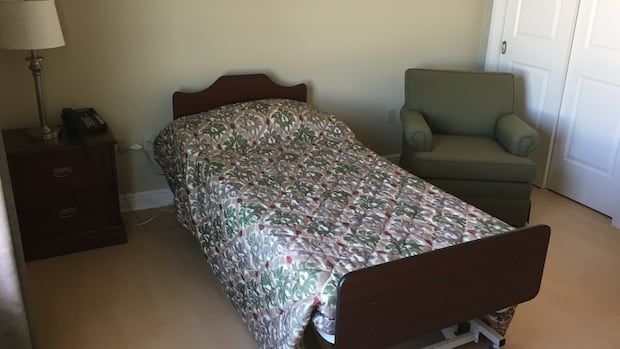ManitobaPolice are asking a court to find a Winnipeg personal care home in contempt, because the home refused to hand over information from a critical incident report conducted after a 90-year-old woman died there following a fall out of bed last October.Winnipeg police want Concordia Place to be forced to comply with production order granted earlier this yearCaitlyn Gowriluk · CBC News · Posted: Aug 20, 2025 6:00 AM EDT | Last Updated: 3 hours agoA care home bed is seen in a file photo. Concordia Place, a personal care home in Winnipeg, is in a legal dispute with police over information it failed to hand over related to a critical incident investigation. (Sara Fraser/CBC)Police are asking a court to find a Winnipeg personal care home in contempt, because the home refused to hand over information from a critical incident report conducted after a 90-year-old woman died there following a fall out of bed last October.The Winnipeg Police Service filed a notice of application earlier this month in Manitoba’s Court of King’s Bench, asking the court to find Concordia Place guilty of common law contempt for failing to comply with a production order.The dispute began after the Winnipeg Police Service got the production order in February, asking Concordia Place to disclose a list of information, including reports related to the woman and communications, including emails, during the home’s investigation into her injury and death.The care home — which is operated by Concordia Hospital under an agreement with the Winnipeg Regional Health Authority — responded the following month, providing some of the information police asked for. The Concordia Place personal care home is next to the city’s Concordia Hospital in northeast Winnipeg. (concordiaplace.ca)However, it said in a letter later submitted as a court exhibit that provincial legislation prevented it from sharing other documents investigators requested, including reports prepared for the critical incident committee, as well as communication during the care home’s investigation into the woman’s injury and death.Manitoba Health investigates all critical incidents, which it defines as “an unintended event that occurs when health services are provided to an individual and results in a consequence to him or her that is serious and undesired.”Police asked the court in the contempt application to impose a penalty on the care home “which the court deems fit,” including an order forcing it to comply with the production order.The update comes after Concordia Place filed a notice of application last month asking the court to quash the production order, arguing in part that the judge who granted it failed to impose adequate conditions to minimize the risk of disclosing the privileged information, and that the order was overly broad.The Law Courts Building in Winnipeg is seen in a file photo. The Winnipeg Police Service filed a notice of application for contempt of court earlier this month in Manitoba’s Court of King’s Bench, asking the court to find Concordia Place guilty of common law contempt for failing to comply with a production order. (Chelsea Kemp/CBC)It pointed to sections of the Manitoba Evidence Act and the Health System Governance and Accountability Act as reasons it was barred from disclosing the information.”Because of these statutory provisions against disclosure, Concordia Place staff are assured confidentiality in the critical incident process,” the notice of application said.”They are told that this process is strictly confidential and based on provincial laws, critical incident documents are not compellable in court. This is designed to create a culture of safety, and to encourage reporting and participation in the investigation and review of critical incidents.” The critical incident in question was reported at the care home on Oct. 9, 2024, when a woman with dementia fell out of bed and was lifted back in by a health-care aide, the care home’s July filing said.The woman was said to have been experiencing an overall general decline in health in the year preceding the fall.The morning after the incident, skin changes and swelling were observed on the woman, and an X-ray confirmed she had a fractured leg, but due to her age and other existing medical conditions, she was not considered for surgery to repair the fracture, the court filing said.The application said the woman died a week after the fall, but there is no evidence the fall caused her death.The matter appeared in a Winnipeg courtroom last week and was adjourned without setting a next date.ABOUT THE AUTHORCaitlyn Gowriluk has been writing for CBC Manitoba since 2019. Her work has also appeared in the Winnipeg Free Press, and in 2021 she was part of an award-winning team recognized by the Radio Television Digital News Association for its breaking news coverage of COVID-19 vaccines. Get in touch with her at caitlyn.gowriluk@cbc.ca.Follow Caitlyn Gowriluk on X
Friday, 6 Feb 2026
Canada – The Illusion
Search
Have an existing account?
Sign In
© 2022 Foxiz News Network. Ruby Design Company. All Rights Reserved.
You May also Like
- More News:
- history
- Standing Bear Network
- John Gonzalez
- ᐊᔭᐦᑊ ayahp — It happened
- Creation
- Beneath the Water
- Olympic gold medal
- Jim Thorpe
- type O blood
- the bringer of life
- Raven
- Wás’agi
- NoiseCat
- 'Sugarcane'
- The rivers still sing
- ᑲᓂᐸᐏᐟ ᒪᐢᑿ
- ᐅᑳᐤ okâw — We remember
- ᐊᓂᓈᐯᐃᐧᐣ aninâpêwin — Truth
- This is what it means to be human.
- Nokoma











